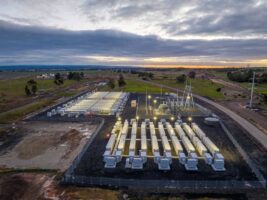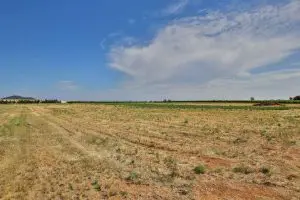New South Wales network operator Ausgrid has unveiled its first community battery in the northern Sydney suburb of Beacon Hill, kicking off a two-year trial that aims to soak up consumer generated solar and use it to push down energy prices and help stabilise the local grid.
The Beacon Hill battery, pictured above, is a 150kW/267kWh MTU Energy Pack QS. The trial is seeking to enlist the participation of Ausgrid customers in the Northern Beaches area who either have solar power systems installed already, or who are about to install one. Eligible customers can register their interest here.
Additional community batteries are planned for the Canterbury Bankstown and Lake Macquarie areas – and these, according to an Ausgrid spokesperson, will likely be supplied by Tesla. But Ausgrid says they could be the first of many as community batteries become the next big thing.
Like other such trials being conducted around Australia, Ausgrid’s plan is to offer access to shared storage on parts the grid where rooftop solar uptake is high, allowing households to get more bang for their solar buck without having to shell out for a battery system of their own.
At the same time, the community battery will also work to soak up excess solar in the middle of the day, storing it for use when the sun goes down and the air-conditioners go on, thereby helping to smooth demand and cut the energy costs of the broader community.
The trial comes two years after being flagged by Ausgrid, as a way to get “closer to consumers” and help usher in the next stage of the energy transition.
“I see a world where I am sitting at home with an app, seeing opportunities to trade, to arbitrage price movements, and all this can be done while I am sitting watching Game of Thrones,” Ausgrid CEO Richard Gross told RenewEconomy in late 2018.
At the unveiling of the Beacon Hill battery on Monday, Gross hailed the launch of the Beacon Hill community battery as “an exciting milestone for Ausgrid” and a first step towards keeping downward pressure on energy prices, while also supporting the use of renewable energy.
We’re excited to launch our first Community Battery, marking the start of a 2 year trial that aims to transform the way solar energy is stored. Thanks to @Matt_KeanMP, Mayor Michael Regan and Northern Beaches Council for supporting our launch in Beacon Hill this morning. #solar pic.twitter.com/Y4dr3jvf1z
— Ausgrid (@Ausgrid) February 15, 2021
“We believe community batteries are the most cost effective way to bring renewable energy into the grid,” Gross said.
“They provide a service to the residents, allowing them to store their solar, a service to the community by supporting the local network and they provide system security benefits by helping to firm renewables wherever they are generated.
“We are confident the trial will show that community batteries have a huge role to play in the low-cost transition of our energy system.” He said the batteries would cost around $400,000 each, and would deliver annual savings of between $100 and $300 a year to consumers.
NSW energy minister Matt Kean was also present at the battery’s launch, describing it as a win for the community, a win for the environment, and as a first for the “Superpower State,” where rooftop solar is being installed at a rate second only to Queensland.
“It’s exciting to see Ausgrid share the vision we have in NSW to use technology and innovation to deliver some of the cheapest, cleanest and most reliable electricity anywhere in the world,” Kean said at the launch.
“We’ve seen a huge uptake in rooftop solar, but consumers haven’t had a lot of choice when it comes to storing and sharing that cheap energy – community batteries like this could be the solution to that problem.”
Certainly, this has been the thinking in Western Australia, where Western Power and Synergy have kicked off a third community battery trial, this time offering up to 600 homes virtual solar storage via nine new Tesla PowerBank installations.
And in Melbourne, network distribution company CitiPower announced last month that a series of community-scale batteries would be installed across the inner-city suburbs in a joint venture with not-for-profit Yarra Energy Foundation.










